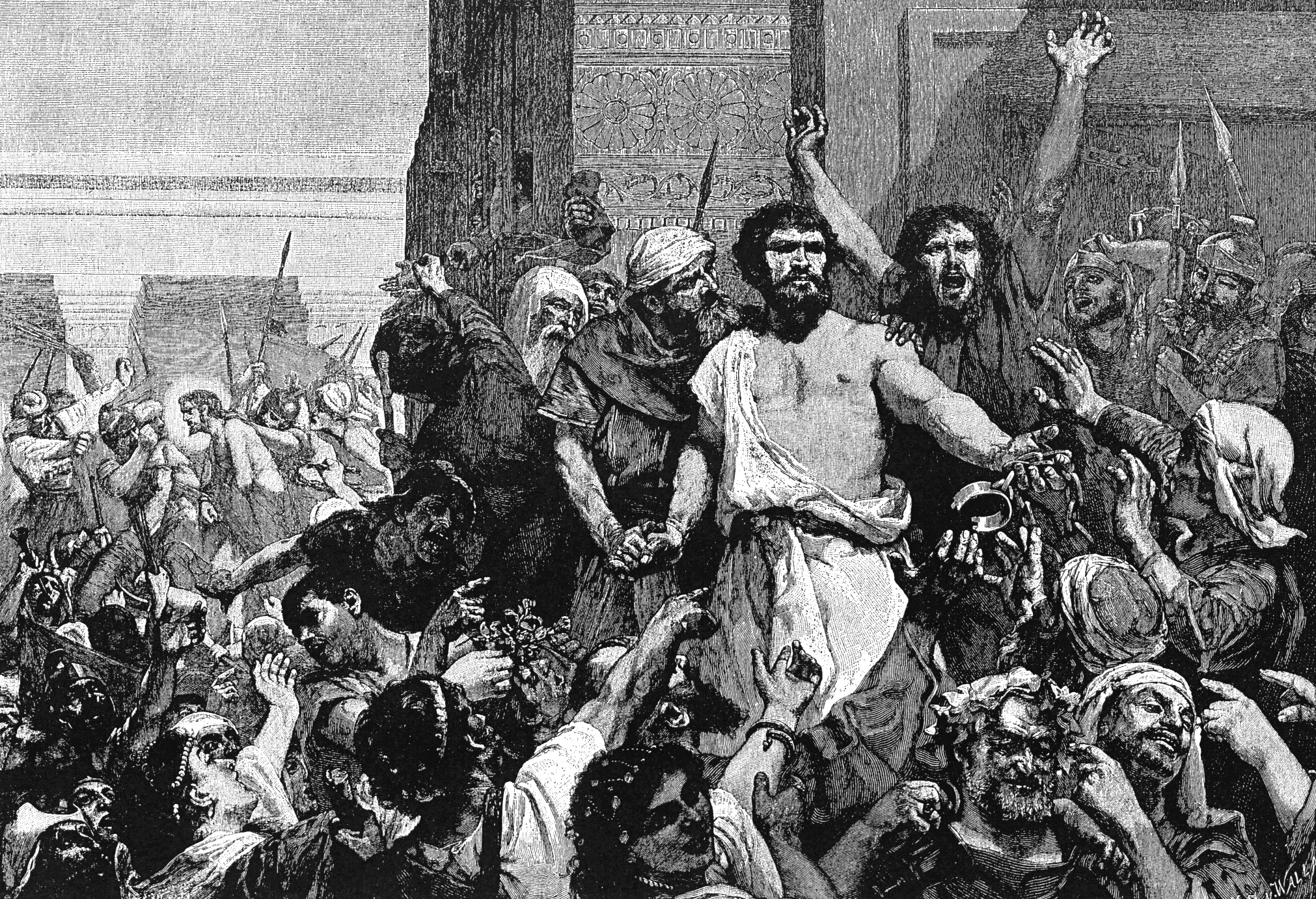Sermon - Palmarum 2024 - Matthew 26:1-27:66
 |
| Give Us Barabbas, 1910 |
Jesus takes the place of a Criminal
Jesus took the place of Barabbas
Jesus took our place
His blood is on us and on our children
I really appreciate the story of Barabbas. Barabbas is legitimately a criminal; he’s an insurrectionist and a murderer. Jesus is charged with insurrection, but is innocent and everyone knows it. Barabbas deserves to die, but he goes free. Jesus deserves to live, and he is crucified. Jesus takes the place of a criminal.
This story of Barabbas is actually a very beautiful parallel to Yom Kippur, the Day of Atonement. This was the most solemn feast among God’s people in the Old Testament. This was the one day of the year when the high priest entered the holy of holies in the temple or tabernacle. On this day two male goats were taken. One of those goats was to be taken for the sin offering, and the other was the scapegoat.The goat which was to be offered for sin was sacrificed and its blood was sprinkled in the temple to make atonement because of the people’s sins. The scapegoat had the sins of the people of Israel placed upon it and was led into the wilderness and set free. One was killed and its blood shed for the sins of the people, and the other went free.
In fulfillment of that old testament sacrifice, Barabbas is like the scapegoat and was set free, while Jesus was offered up as sacrifice for the sins of His people by shedding His blood. It’s with great irony that the people cried out: “His blood be on us and on our children!” They meant it for evil, but we say the same thing meaning it for good, because Jesus’ blood cleanses us of our sins.
What’s more, Jesus and Barabbas share some interesting similarities. Both of them are accused of insurrection, but the similarities are even greater than that. According to some other manuscripts, there’s a textual variant that gives Barabbas’s full name as Jesus Bar Abbas. Jesus was a common name at that time, so that wouldn’t be surprising. And Barabbas means son of the father, bar=son, abba=father. So here we have two Jesuses, both sons of the father. One of them is guilty and deserves the death penalty, the other is innocent and does not.
Barabbas woke up that Friday morning knowing that he was about to be crucified for his sins. But by the end of the day he saw an innocent man willingly take his place and hang on the cross that should have been his own; Barabbas went free and Jesus died. I know we don’t know for sure what happened to Barabbas afterwards, but according to some traditions Barabbas watched the crucifixion of Jesus and became a Christian. I don’t know if that’s true or not, though I’d like to think it’s true. Mainly because how could you watch those things happen and not at the end of the day confess with the centurion: “Truly this was the Son of God!”
It’s such a powerful image because it’s a clear reminder that Jesus took our place. We’re the guilty criminal, we’re the sinner, we’re the ones deserving of death, but we go free and Jesus is crucified. Because Jesus took our place, we also took His place, and therefore we are privileged to be called like Him, sons of the Father. We are God’s children because Jesus took our place; God is our Father. Jesus is the offering for sin, and His blood was poured out for us, atoning for all of our transgressions. We, like Barabbas, sort of like the scapegoat, get to go free.
I’m sure we don’t like to think of ourselves like Barabbas in this story, but we should. If you look up artwork about Barabbas, he usually looks like a disgusting, ugly, violent, mean, criminal. And he should look like that because he was! Nevertheless, in love Christ Jesus laid down His life for him as a sacrifice for sins.
Perhaps we have a hard time seeing notoriously sinful people coming to faith in Jesus and being forgiven, but it happens. For example some well known criminals, like Jeffrey Dahmer, converted to Christianity while in prison. It’s true, those people don’t deserve to go to heaven, but then again neither do we. Jesus came to lay down His life for ugly criminals, for disgusting sinners, for us, so that we might go freely into paradise.
Our desire is that “His blood be on us and on our children!” Because by His atoning blood He has forgiven us our sins. In the waters of baptism we do not wash our hands of Jesus’ blood, like Pilate, instead in baptism Jesus’ blood covers us and washes us of all our sins. In the Lord’s Supper Jesus feeds us His lifeblood that was poured out for us and for the forgiveness of our sins. By shedding His blood, He has shared His blood with us, so that we too can be called Barabbas, sons of the Father, children of the Heavenly Father.
Comments
Post a Comment